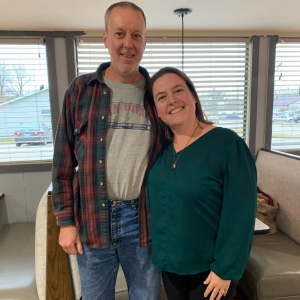One Woman’s Desire to Make a Difference Leads to Kidney Donation

A college ethics class 20 years ago made such an impact on Sarah Goleman, 41, that she recently donated a kidney to a stranger. The class explored whether individuals have a moral obligation to improve the lives of others. Those discussions planted the idea of becoming a living organ donor with Sarah who began researching the process.
Years later, the financial advisor, who lives in Divernon with her husband and two children, applied with the national donor registry without realizing Springfield Memorial Hospital (SMH) offered a robust transplant care program.
When a friend who served as a local fire department volunteer needed a kidney, Sarah learned about the Alan G. Birtch, MD, Center for Transplant Services at SMH. She and her friend didn’t end up being a match, but she was later matched with another patient on the transplant list. Sarah became a non-directed living donor, which means she didn’t know her intended recipient.
“It was a good point in my life,” Sarah said. “My children are 9 and 6. My work has a time-off system that allows for kidney donation. I’m in good health. For me to do this was not a significant thing – I was in a fortunate position.”
But receiving Sarah’s kidney was a very significant thing for Todd Frey, 52, of Teutopolis. Todd’s father died at a young age from cystic kidneys, and all three of his children tested positive in high school for the same disease. All three have since undergone kidney transplants.
Neither Todd nor his two siblings ever required dialysis, but Todd came the closest to needing that treatment. He had started feeling worn down and knew it was a matter of time. He was on the transplant list for more than a year, and when the call finally came in, he thought he was being put on dialysis. Instead, he was told a match had been made.
“The care was incredible, along with the staff,” Todd said of his experience throughout his transplant journey. “I had my mind set it would be miserable, but they’ve come a long way in what they can do.”
Per transplant regulations, both the donor and the recipient have the option to stay anonymous. But they can also agree to lift the confidentiality. After the six-month waiting period elapsed, Sarah wrote a letter to the recipient of her kidney. Once Todd received her letter, the two decided to meet over coffee. He was a little nervous about it, but the two connected easily and have stayed in touch.
Today, Todd is back to doing the things he loves – working outside in the yard, going for nature hikes, spending time with his fiancée. Sarah continues to advocate for organ donation. She encourages people who might be interested to go and talk with the transplant team at SMH and to take the initial training class.
“I really hope that just one person reads this and looks into it,” she said.
Related
Memorial Health Transplant Care
Busting the Top Three Myths about Organ Donation
After Five Years on Transplant List, Local Man Receives New Kidney